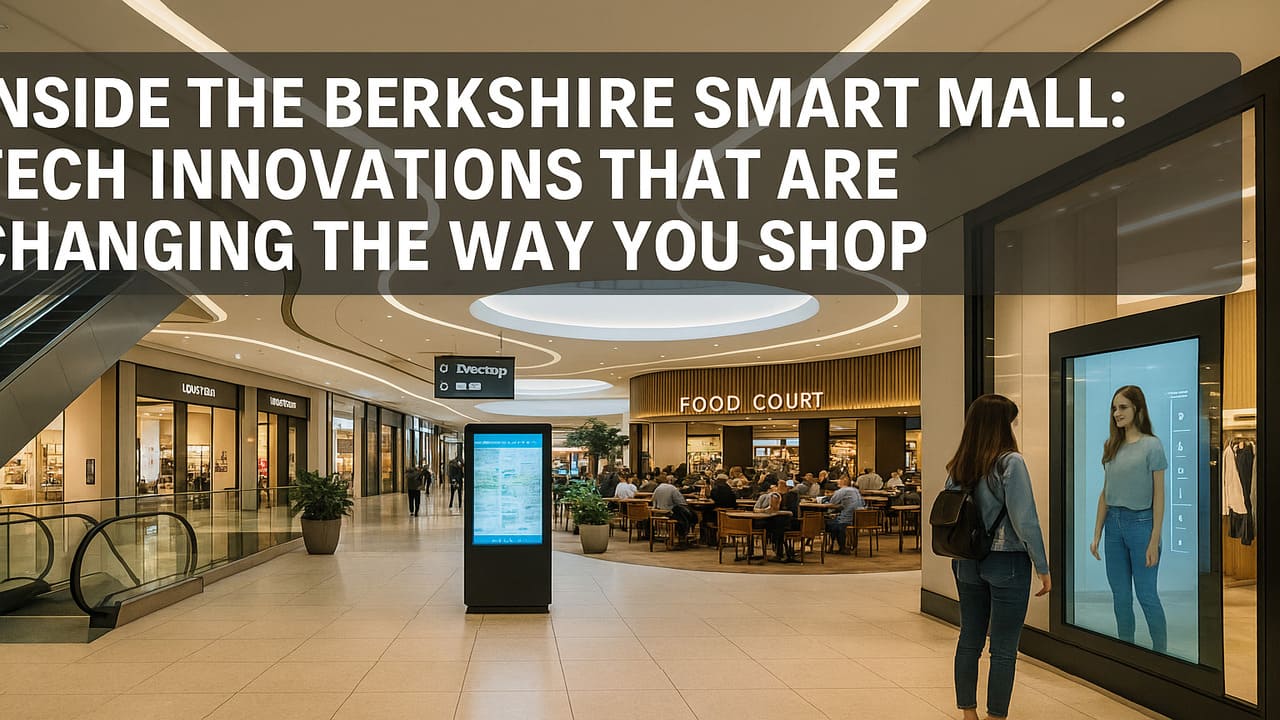
The Berkshire Mall – A shopping destination redefining how people interact with retail spaces. Gone are the days when malls were simply clusters of stores and food courts. In today’s digital-forward age, Berkshire has emerged as a model of how Smart Mall can evolve through technology, turning shopping into a seamless, data-driven, and experience-rich journey.
At first glance, Berkshire Smart Mall may look like any other upscale shopping complex. But once inside, the difference becomes apparent automated systems, personalized interactions, and cutting-edge digital infrastructure shape everything from parking to purchasing. It’s not just shopping it’s a connected lifestyle.
Your visit to Berkshire Smart Mall begins long before you step inside. With its integrated smart parking system, visitors can reserve spots via an app, guided by real-time sensors that monitor space availability. License plate recognition at the entrance triggers automated gate access, ensuring zero delays. The system even remembers your previous preferences, guiding you to your favorite lot.
This frictionless entry experience is the first taste of how tech is optimizing consumer convenience. And it sets the tone for what’s inside: a mall that knows how to adapt to your needs.
Also Read : Beyond the Booths: How Seasonal Markets Bring Communities Together at the Berkshire Mall
Once inside, visitors are greeted by interactive digital directories powered by artificial intelligence. These kiosks don’t just show maps they learn. Based on user behavior, time of day, and even foot traffic patterns, they suggest not just directions but personalized store recommendations and limited-time offers.
The mall’s mobile app takes this even further. Synced with your shopping history and interests (with user consent), it delivers real-time deals, loyalty rewards, and even guides you through an optimized path based on your shopping list. Shopping at Berkshire is no longer passive; it’s curated.
Gone are the days of long lines at dressing rooms. Berkshire’s fashion retailers feature augmented reality (AR) fitting stations, allowing users to “try on” clothes virtually via smart mirrors. Just pick an item from the rack, scan it, and the mirror will display how it looks on your body in real time.
Some stores have taken this further with AI style assistants that suggest complementary items, creating full outfits based on trends, your body shape, or even the weather. It’s like having a stylist only smarter and faster.
Cashiers are increasingly rare at Berkshire Smart Mall. Most stores utilize touchless payment systems, enabling transactions via facial recognition, fingerprint scanning, or mobile wallet taps. For those unfamiliar, friendly virtual checkout assistants guide users through the process via voice or touchscreen.
This not only speeds up transactions but enhances safety an especially valuable feature during the post-pandemic era. Retailers benefit too, with data dashboards providing real-time inventory updates and customer purchase trends.
Also Read : The Impact of Android Gaming on the Traditional Console Market
Shopping isn’t the only thing Berkshire has reimagined. The mall features immersive entertainment zones powered by virtual and augmented reality. From VR arcades to interactive art installations and gamified kids’ zones, technology is not just a tool it’s part of the experience.
Even the food court is smart. AI-powered kiosks analyze queue patterns to reduce wait times, and table sensors alert staff for quicker service. Some eateries offer robot-assisted delivery, with wheeled servers bringing meals to your table.
Beyond physical innovation, Berkshire Mall is evolving into a data-rich ecosystem. Foot traffic, purchase behaviors, environmental conditions, and social sentiment are constantly analyzed not for surveillance, but to improve user experience and operational efficiency.
Store owners get access to dashboards showing peak times, shopper demographics, and product interest metrics. Meanwhile, customers benefit from more relevant suggestions and personalized promotions, all driven by machine learning.
What Berkshire Smart Mall represents is not just the modernization of a shopping center it’s a glimpse into the future of smart retail ecosystems. In this vision, malls aren’t dying they’re adapting. By leveraging AI, AR, IoT, and data intelligence, spaces like Berkshire become living platforms customizable, responsive, and constantly learning.
As more cities explore how to keep malls relevant in a digital economy, Berkshire stands as an example of what’s possible when tech is integrated with intention, not just aesthetics. The innovations seen here are only the beginning, and the path ahead promises even more interaction between the physical and digital shopping experience.